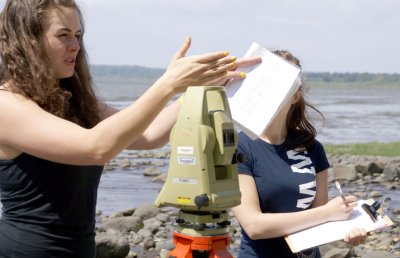Honors Program graduates bright, gifted students
Western sophomore Angela Gelfer has always been a kind of student who enjoys challenging herself. At Western, she found her niche in the Honors Program, a rigorous academic program for highly motivated and excelling students. Gelfer, a geology student and member of Western’s NCAA champion women’s rowing team, finds a way to balance rigorous classes that include lengthy labs and a sport – in her case, one that is both physically demanding and time-consuming. That’s the way of life for most honors students at Western.
Admission to the program is based solely on academic record, and while Honors students are high academic achievers, the program attracts some of the university’s most balanced and involved students. Like Gelfer, many of them are also athletes or musicians – generally well-rounded individuals who know how to juggle many responsibilities and activities.
The program appeals to high-achieving students, says Honors Program director and history professor George Mariz, because of the attention they receive here. With about 60 honors students per year graduating and a low professor-to-student ratio, students have access to private-college education within a larger university – without the hefty private-college price tag.
The past few years have seen high student interest, with about 480 applicants in 2010, about 530 in 2011 and a record-shattering 870 this year. One of every 11 students who applied to Western this year also applied to the Honors Program.
Mariz has noticed an overlap between students who are applying to Western Honors and students applying to private small liberal arts colleges, and in some years, even the larger, more well-known schools such Stanford, Rice and Yale.
Honors courses are not necessarily harder, he says; they are just a different kind of work. They’re discussion-based and push for critical thinking.
“Our classes are small, they’re highly interactive – there’s a lot of interaction between students and faculty, a lot of interaction among students themselves,” Mariz says.
The priority deadline for the new wave of Western Honors hopefuls to submit their applications is Jan. 31. Mariz and his associates will be looking for students with high grade-point averages and high test scores. While there are basic qualifying requirements to be considered for the program – applicants must have at least a 3.8 GPA, a 1250 SAT score or a 28 ACT score – a 4.0 gpa does not guarantee admission. Instead, decisions are made on a case-by-case basis.
“We look at individual students,” Mariz says. “We are just at least as interested in the strength of the students’ curriculum. We want to see students who have taken a strong mix of courses: four years of science, English, mathematics, history, have written a lot, taken International Baccalaureate, Advanced Placement classes and pushed themselves.”
The committee looks carefully at a required letter of evaluation from a teacher or counselor; just as important is the academic writing sample that reflects the student’s writing ability. In short, a 4.0 gpa might not get you in, but a bad writing sample will get you out, Mariz says.
Gelfer is the kind of student the committee has in mind, and she also represents an interesting phenomenon in the program. Whereas most honors programs typically focus on humanities and social sciences, about 40 percent of Western’s honors students are in the natural sciences. And while Western’s studentbody as a whole is 54 percent female and 46 percent male, the Western Honors Program is 72 percent female and 28 male.
The students often come to Western specifically for the science programs, Mariz says, because Western boasts top-notch science faculty and excellent, cutting-edge facilities.
“Neuroscience is brand-new; chemistry’s labs went through an upgrade in the last year. The opportunities for undergraduate research here are really exceptional,” he says. “There are probably places that are just as good for undergraduates in the natural sciences. I don’t think there are any that are better than we are.”
Gelfer says she enjoys her major for those reasons. And she said the fact that professors in honors classes hold their students to a higher standard of academic thought forces her not to slack off.
“I get a lot more out of the classes,” she says. “It’s the quality of the instructors – we focus a lot on undergraduate research and developing personal relationships with the professors.”
She hopes to earn a bachelor’s degree with honors. After that, graduate school is not out of the question.
There’s another perk for Gelfer and the generations of students who've completed the WWU Honors Program. Honors alumni enjoy the benefits of graduating from the program when they are applying to medical school, law school or in any kind of competitive situation, Mariz says. They often find that the honors notation on their transcript tends to keep them in the “in” pile when it comes to admissions – or it will at least count in the plus column.
Western honors alumni have been accepted into the country’s most rigorous graduate programs. Alumna Kathryn Mertens, who graduated from Western in fall 2010 with a degree in biological anthropology, will start attending the University of Washington medical school this fall. History alumnus Shaun Nichols was accepted to Harvard University to pursue a doctorate in American labor history even before he graduated from Western in spring 2010.
And while it may not be merely completing the program that gets them into the rigorous programs, honors alumni say they felt prepared for graduate-level work.
“I appreciated the Honors Program because unlike the rest of my science classes, my honors courses were completely different in curriculum and provided a broader education for me,” Mertens says. “Honors courses helped me improve my writing and communication skills, which prepared me immensely for the medical school application process, as it required multiple essays and interviews.”
When Nichols got to Harvard, he said, he soon realized some of the things the graduate seminars demanded – active participation, deep thinking and a willingness to engage in the viewpoints of others – were many of the same things professors expected from him at Western’s Honors Program.
To any incoming freshman who is nervous about applying for the Honors Program, Gelfer says don’t be.
“It’s been one of the most rewarding and awesome parts of my time at Western,” she says. “I can’t imagine what my college career would have been like without it.”

